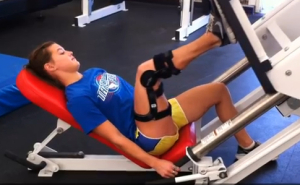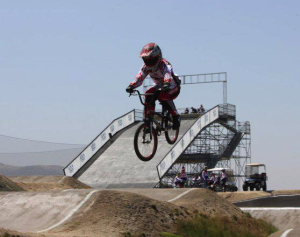 Ask any high-level athlete what their number one goal, or biggest dream is, and the chances are good that two words will roll from their tongue: Olympic Gold. Ask them what their worst fear is, and it would be the idea that something could strip that dream away in the blink of an eye.
Ask any high-level athlete what their number one goal, or biggest dream is, and the chances are good that two words will roll from their tongue: Olympic Gold. Ask them what their worst fear is, and it would be the idea that something could strip that dream away in the blink of an eye.
The dream was Alise Post’s since she was a little girl. A spirited, fearless 21-year old native from St. Cloud, MN, and world-renowned BMX racer, she has endured and accomplished more than most athletes her same age. In 2008, BMX made its big debut at the Olympic games, and while Alise had the speed to contend with the best racers in the world, she was just shy of the age limit to compete. It was then that she set her sights on London to achieve her dream of winning Olympic gold, but it was her journey to get there that made her a true champion.
It goes without saying that it requires certain bravery to race with the best of the best in the world of BMX. With lightening fast speeds, steep hills, sharp turns, and hair-raising jumps, it’s anyone’s race on any given day. But with the level of risk associated with BMX racing, unfortunately, crashes and falls are a staple on the track.
Just a year out from the 2012 London Summer Olympics, Alise came face to face with this grim reality during a training session in Chula Vista, CA on July 21, 2011. Right out of the gate, her speed was fast and clocked right on pace, but after the second hill she lost control and went over the handlebars, her right foot caught in the clasp of her pedal, and within a split second she came crashing down on her right knee, with fierce impact onto the track.
Alise talks about her accident in a video she shot for YouTube just a few days after the incident occurred. Shaken up and devastated by the sudden turn of events in her life, she ponders on her dream and the long road ahead. Within hours of shooting that video, upon the recommendation of the head of the sports medical team, Alise was in the hands of Dr. Robert F. LaPrade, an orthopaedic knee surgeon at The Steadman Clinic in Vail, CO. “I was told he was one of the best in the world in dealing with LCL reconstructions, and I knew my knee was a mess, so that gave me some sense of relief,” said Alise.
Upon a quick physical examination, stress X-rays and an MRI, the damage was clear. In one split second, Alise had torn her LCL, as well as her biceps femoris (hamstring tendon); she also chipped off top of her fibula bone, partially tore her ACL, detached her meniscus, and suffered severe peroneal nerve damage, and some cartilage damage. Within hours Alise was scheduled to undergo surgery in Vail to repair the long list of damaged tendons, ligaments and bones. She also documented this experience in another video detailing her LCL knee surgery.
 During this lengthy surgery, Dr. LaPrade reconstructed Alise’s LCL with a tendon from her inner hamstring and anchored the ligament to secure it; in addition, he reattached the tip of her fibula, stretched her biceps femoris (outer hamstring tendon) back to its full length, and anchored it to her fibula. Dr. LaPrade and his team also spent time cleaning up the loose cartilage and loose bodies that remained in the knee joint, and reattached her meniscus. Because her peroneal nerve was involved during the accident, he also performed a decompression so that Alise would not experience a permanent foot drop—which essentially would have left her paralyzed from the knee down.
During this lengthy surgery, Dr. LaPrade reconstructed Alise’s LCL with a tendon from her inner hamstring and anchored the ligament to secure it; in addition, he reattached the tip of her fibula, stretched her biceps femoris (outer hamstring tendon) back to its full length, and anchored it to her fibula. Dr. LaPrade and his team also spent time cleaning up the loose cartilage and loose bodies that remained in the knee joint, and reattached her meniscus. Because her peroneal nerve was involved during the accident, he also performed a decompression so that Alise would not experience a permanent foot drop—which essentially would have left her paralyzed from the knee down.
“My first thought when I woke up from my surgery, was relief. I was so glad it was over. I was like, ok, here we go. That is behind me, I can do this. I had to really find it within myself to stay mentally focused because I knew my competitors were out there ranking up the points and competing to win spots on the Olympic Team, and I was stuck with a massive knee injury, unable to even bend my knee, walk, and had no idea when I was going to be able to effectively train and get back on my bike. I knew I had a really long recovery ahead of me and it was right then and there that I told myself I would do whatever it took to get 100% better.”
Alise’s LCL knee surgery rehabilitation was very methodical, day-by-day she began movement therapy, which lead to range of motion exercises, strengthening, walking, and finally, getting the opportunity to hop back on her bike. By her 5th month of post-op recovery, Dr. LaPrade gave Alise the green light to get back to full training on her bike and in the gym; soon after, at 6 months post-op, she was back on the race circuit, wearing a fitted knee brace for support.
 In the Spring of 2012, just weeks away from the 2012 Olympic games, Alise raced at the UCI BMX World Cup in Holland where she achieved her first World Cup victory (9 months post-op), and then shortly after received the news that she had claimed the second and final spot on the BMX USA women’s Olympic team as the coaches’ selection. According to Alise, “I was forever grateful for that opportunity.”
In the Spring of 2012, just weeks away from the 2012 Olympic games, Alise raced at the UCI BMX World Cup in Holland where she achieved her first World Cup victory (9 months post-op), and then shortly after received the news that she had claimed the second and final spot on the BMX USA women’s Olympic team as the coaches’ selection. According to Alise, “I was forever grateful for that opportunity.”
Although Alise had a great couple of runs during the London Olympics, she was unable to advance. “To see where I was just before the Olympics, I’m OK with the fact that I didn’t walk away with a medal. Just getting there was an incredible feat for me and I consider myself very blessed to have been there. This past Thanksgiving I won both days of the biggest race of the year and I’m now 14-months post-op, brace-free, and I’m not looking back.”
“This experience really changed my perceptions. Athletes make sacrifices everyday of their life to hopefully be that person that people call the very best in the world. Doing everything they can to make them that one millimeter of a second faster and stronger. It’s indescribable the feeling of having it all stripped away in a matter of a split second. We put our faith into the physicians to get us back where we need to be, and I owe a lot to Dr. LaPrade. I’m focused again on my dream of winning Olympic Gold and I cannot thank Dr. LaPrade enough, and his entire staff, for helping me start my new journey. It was a life-changing, experience.”
While clinical studies support the effectiveness of these procedures, individual results may vary. There are no guarantees of outcome. All surgeries involve the risk of major complications. Before you decide on surgery, discuss treatment options with your doctor. Understanding the risks of each treatment can help you make the best decision for your individual situation. Always ask your doctor about all treatment options, as well as their risks and benefits. Only your doctor can determine the appropriate treatment for your situation. The clinical information and opinions, including any inaccuracies expressed in this material by patients or doctor are not necessarily those of Robert LaPrade, MD and should not be considered as substitute for medical advice provided by your doctor.
